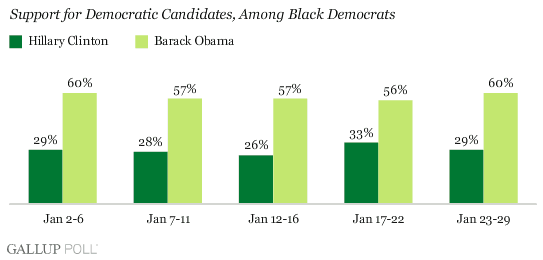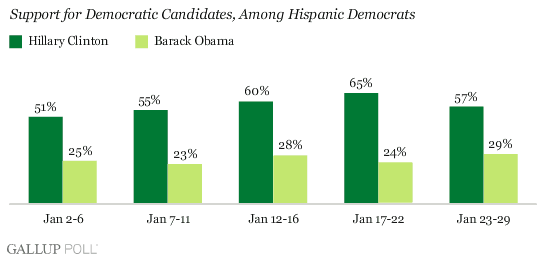PRINCETON, NJ -- A review of candidate support patterns from Gallup Poll Daily tracking interviews conducted over the month of January underscores the significant racial and ethnic divide in the Democratic Party's nominating process this year. Barack Obama is now beating Hillary Clinton by a 2-to-1 margin among black Democrats nationally. Clinton, on the other hand, is beating Obama by almost 30 points among Hispanic Democrats.
Black Democrats
There is a major divide in the Democratic race for president between black Democrats and white Democrats. Blacks throughout the month of January have consistently supported Obama over Clinton by roughly a 2-to-1 margin. In an aggregate of black Democratic voters based on interviewing conducted Jan. 23-29, Obama received 60% of the black vote compared to Hillary Clinton's 29%.

Hispanic Democrats
Clinton has enjoyed a strong positioning in support from Hispanic Democrats. In the recent Jan. 23-29 aggregate, 57% of Hispanics supported Clinton compared to 29% who supported Obama. Gallup's definition of "Hispanics" used in this analysis is the group of respondents who answered "yes" to the question: "Are you, yourself, of Hispanic origin or descent, such as Mexican, Puerto Rican, Cuban, or other Spanish background?"

Implications
This race is the first in U.S. history in which a black candidate is a leader in the race for his party's nomination this deep into the process. Although both Bill and Hillary Clinton have enjoyed strong support in the black community over the years, these data demonstrate conclusively that Obama has been able to gain the allegiance of a clear majority of black Democratic voters throughout this month. The level of that support has varied some from week to week, but Obama has a 2-to-1 margin over Clinton among black Democrats in the latest Gallup aggregate of interviews, conducted from Jan. 23 to Jan. 29.
Obama's strong support was evident in his overwhelming victory in South Carolina, where exit polls showed him receiving up to 80% of the black vote. The vote of black Democrats promises to be significant in many states -- and congressional districts within states -- in next Tuesday's crucial Super Tuesday primaries.
At the same time, Clinton has strong support from Hispanic Democrats across the country. In the Jan. 23-29 aggregate, Clinton has almost a 30-point margin over Obama among Hispanics. The Hispanic vote -- as is the case for the black vote -- will be crucially important in some states voting on Tuesday and in some districts within states with high percentages of Hispanic voters.
It should be noted, of course, that the candidates' relative positioning this year has been subject to substantial change over time. In the broad analysis, daily Gallup tracking shows that Obama is catching up with Clinton after his victory in South Carolina last Saturday and after high-profile endorsements of members of the Kennedy family. It is possible, therefore, that Obama's support among blacks could climb even higher between now and next Tuesday, and that Clinton's support among Hispanics could weaken. Gallup will publish an updated analysis before voting begins on Super Tuesday.
Survey Methods
These results are based on telephone interviews with randomly selected samples of 1,081 Hispanic Democratic voters and 1,520 black Democratic voters interviewed between Jan. 2 and Jan. 29, 2008. These interviews are part of the Gallup Poll Daily tracking project, involving independent random samples of the U.S. adult population conducted on a daily basis. For results based on each aggregate of Hispanic and black voters, one can say with 95% confidence that the maximum error attributable to sampling and other random effects is ±6 percentage points.
Interviews are conducted with respondents on land-line telephones (for respondents with a land-line telephone) and cellular phones (for respondents who are cell-phone only).
In addition to sampling error, question wording and practical difficulties in conducting surveys can introduce error or bias into the findings of public opinion polls.
